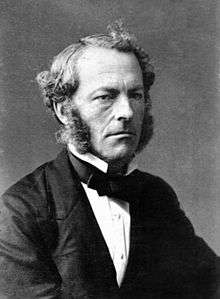Lucasian Professor of Mathematics
The Lucasian Chair of Mathematics is a mathematics professorship in the University of Cambridge, England; its holder is known as the Lucasian Professor. The post was founded in 1663 by Henry Lucas, who was Cambridge University's Member of Parliament from 1639–1640; and it was officially established by King Charles II on 18 January 1664. It was described by The Daily Telegraph as one of the most prestigious academic posts in the world[1] and its former holders include Isaac Newton, Joseph Larmor, Charles Babbage, George Stokes, Paul Dirac and Stephen Hawking.
History of the Chair
Lucas, in his will, bequeathed his library of 4,000 volumes to the university and left instruction for the purchase of land whose yielding should provide £100 a year for the founding of a professorship.[2] The previous holder of the post was the theoretical physicist Michael Green who was a fellow in Clare Hall at the University of Cambridge. He was appointed in October 2009,[3] succeeding Stephen Hawking, who himself retired in September 2009, in the year of his 67th birthday, as required by the University.[4] Hawking now holds the position of Emeritus Lucasian Professor of Mathematics. The 19th Lucasian Professor is Michael Cates, succeeding Michael Green now retired, starting from 1 July 2015.[5]
List of Lucasian Professors
| # | Year of appointment | Portrait | Name | Speciality | Tenure (years) |
|---|---|---|---|---|---|
| 1 | 1663 |  |
Isaac Barrow (1630 – 1677) |
Classics and mathematics | 6 |
| 2 | 1669 |  |
Isaac Newton (1642 – 1726) |
Mathematics and physics | 33 |
| 3 | 1702 |  |
William Whiston (1667 – 1752) |
Mathematics | 9 |
| 4 | 1711 |  |
Nicholas Saunderson (1682 – 1739) |
Mathematics | 28 |
| 5 | 1739 |  |
John Colson (1680 – 1760) |
Mathematics | 21 |
| 6 | 1760 |  |
Edward Waring (1736 – 1798) |
Mathematics | 38 |
| 7 | 1798 |  |
Isaac Milner (1750 – 1820) |
Mathematics and chemistry | 22 |
| 8 | 1820 |  |
Robert Woodhouse (1773 – 1827) |
Mathematics | 2 |
| 9 | 1822 |  |
Thomas Turton (1780 – 1864) |
Mathematics | 4 |
| 10 | 1826 |  |
George Biddell Airy (1801 – 1892) |
Astronomy | 2 |
| 11 | 1828 |  |
Charles Babbage (1791 – 1871) |
Mathematics and computing | 11 |
| 12 | 1839 |  |
Joshua King (1798 – 1857) |
Mathematics | 10 |
| 13 | 1849 |  |
George Gabriel Stokes (1819 – 1903) |
Physics and fluid mechanics | 54 |
| 14 | 1903 |  |
Joseph Larmor (1857 – 1942) |
Physics | 29 |
| 15 | 1932 |  |
Paul Dirac (1902 – 1984) |
Physics | 37 |
| 16 | 1969 | James Lighthill (1924 – 1998) |
Fluid mechanics | 10 | |
| 17 | 1979 |  |
Stephen Hawking (born 1942) |
Theoretical physics and cosmology | 30 |
| 18 | 2009 |  |
Michael Green (born 1946) |
Theoretical physics | 6 |
| 19 | 2015 |  |
Michael Cates (born 1961) |
Statistical mechanics of soft condensed matter | current |
Cultural references
In the final episode of the science-fiction television series Star Trek: The Next Generation, one of the main characters, the android Lieutenant Commander Data, holds the Lucasian Chair in the late 24th century.[6][7][8]
Notes
- ↑ "Michael Green to become Lucasian Professor of Mathematics". The Daily Telegraph. Retrieved 11 December 2012.
- ↑ "A Brief History of The Lucasian Professorship of Mathematics at Cambridge University." Check
|url= - ↑ http://timesonline.typepad.com/science/2009/10/stephen-hawkings-successor-as-lucasian-professor-of-mathematics-michael-green.html Archived 18 February 2010 at the Wayback Machine
- ↑ "Hawking gives up academic title". BBC News. 30 September 2009. Retrieved 1 October 2009.
- ↑ "Cambridge University Reporter No 6380". 18 March 2015. Retrieved 19 March 2015.
- ↑ http://theconversation.com/from-newton-to-hawking-and-beyond-a-short-history-of-the-lucasian-chair-40967
- ↑ http://als-ny.org/blog/michael-zaslow-first-redshirt-on-star-trek-the-original-series-died-11-years-ago-from-als/
- ↑ http://phys.org/news/2014-03-video-theory-scaled.html video interview of Michael Green where he mentions Data as a future Lucasian Chair holder
References
- Kevin Knox and Richard Noakes, From Newton to Hawking: A History of Cambridge University's Lucasian Professors of Mathematics ISBN 0-521-66310-5
| ||||||